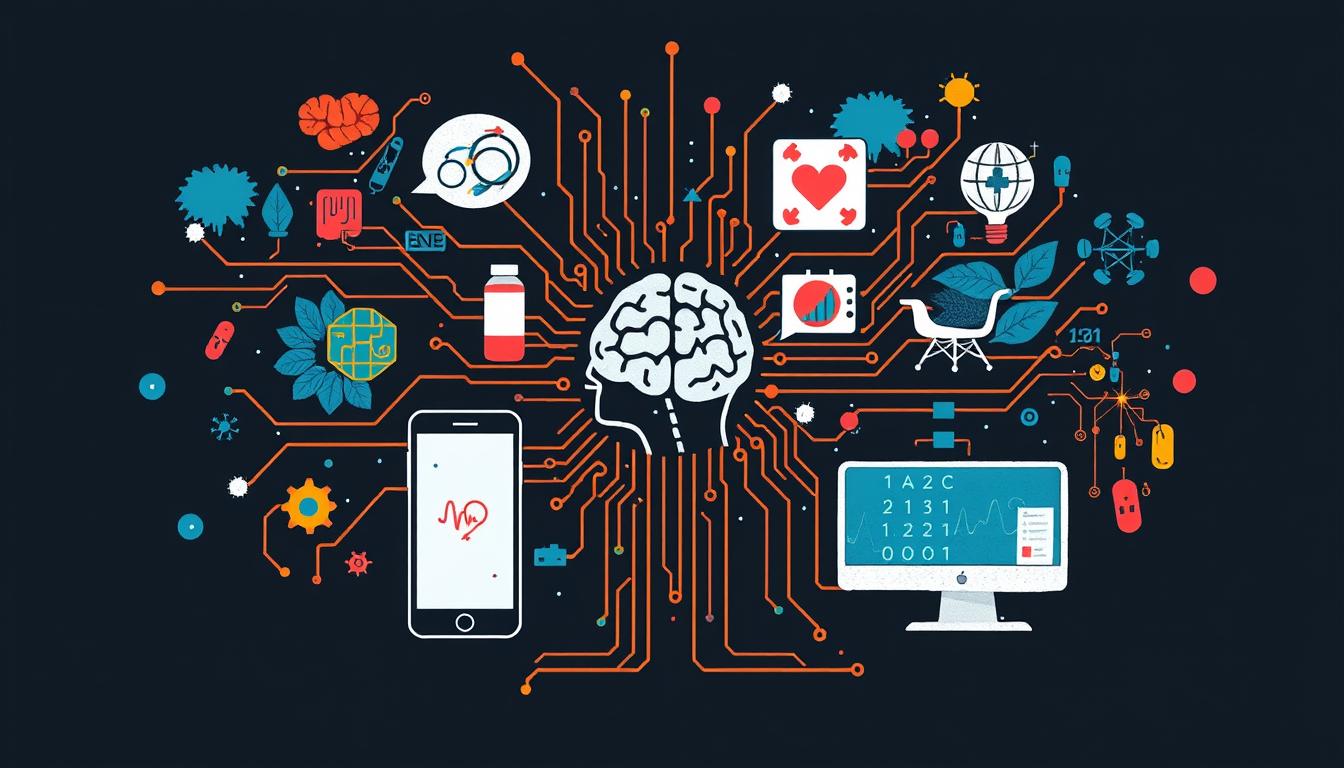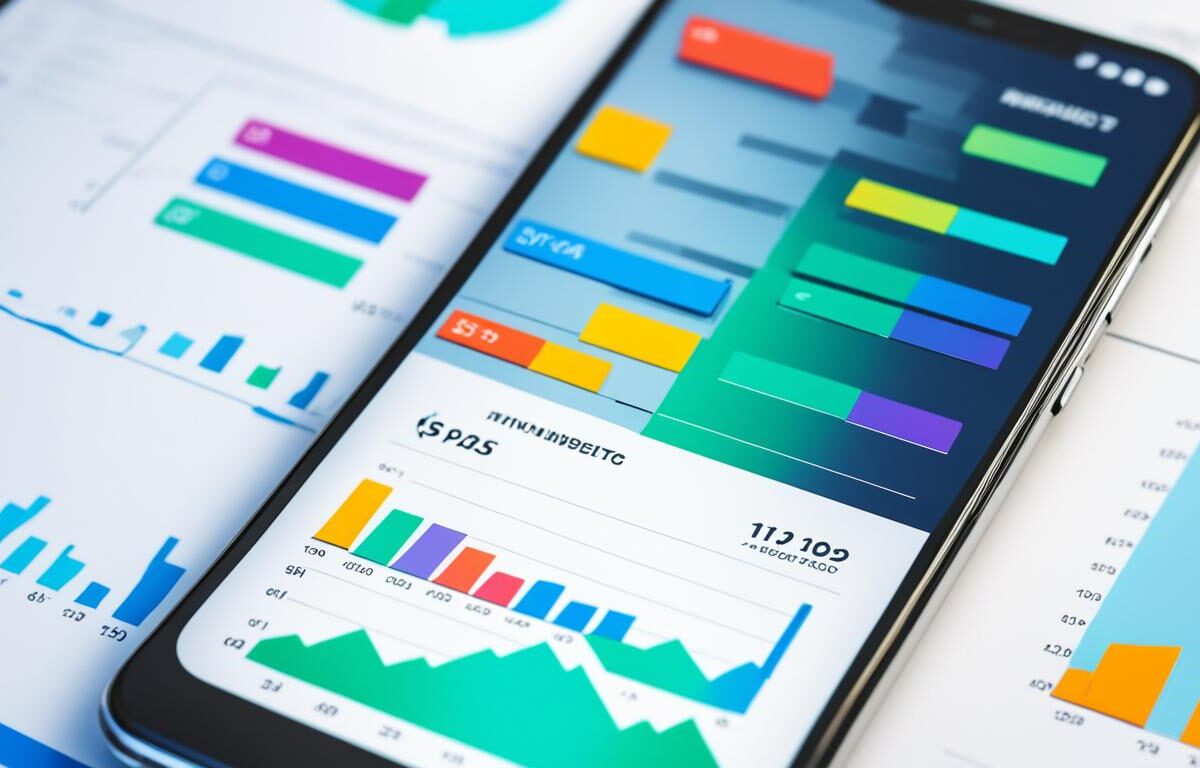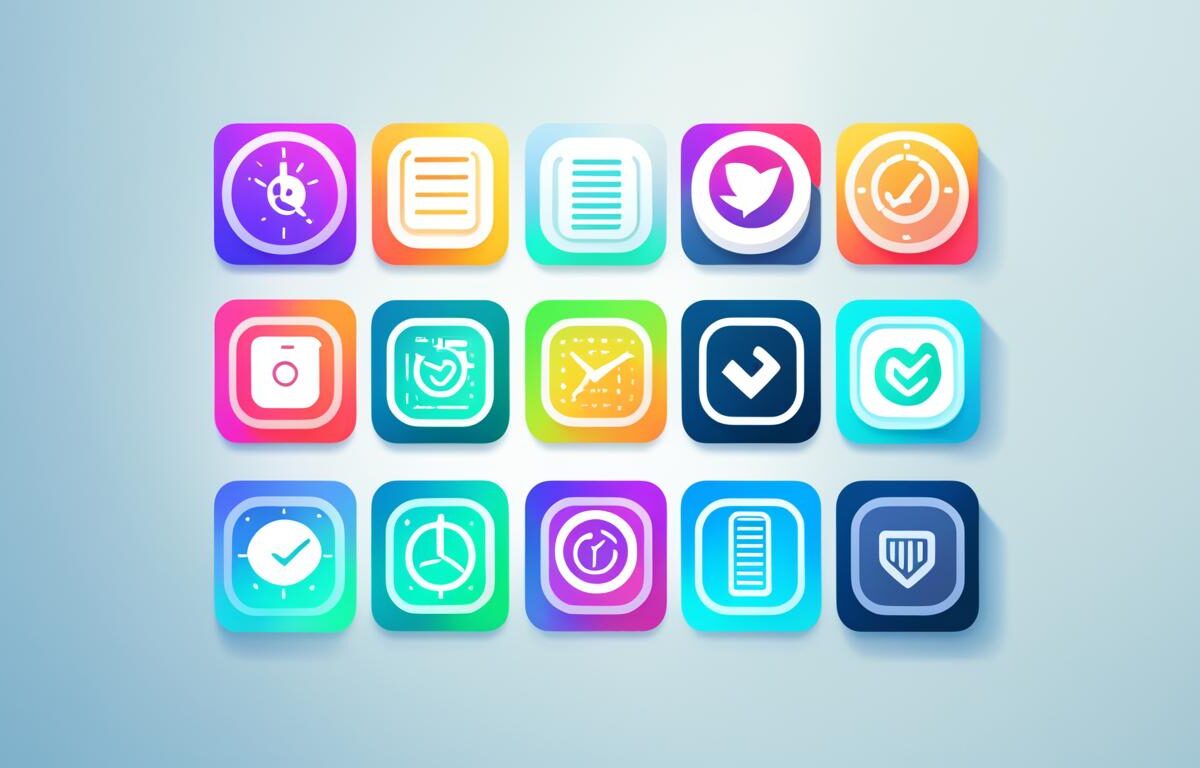The COVID-19 pandemic has shown us the need for better mental health support. Technology is now helping us tackle this issue in new ways. Digital tools like mobile apps, virtual reality, and artificial intelligence are making mental health care better. They make services more accessible, tailored, and based on data. These technologies let mental health experts offer more treatment options. This leads to better results and helps more people get the care they need.
There are now thousands of mental health apps available, and the number keeps growing. Even though there’s not much regulation, researchers are working hard. They’re creating apps for self-management, cognitive improvement, and skill building. These digital tools have a lot of potential to help people manage their mental health.
What is Digital Mental Health?
Digital mental health uses digital tech in mental health care. It includes tools like mobile apps, virtual reality, and AI. These tools help with mental well-being, early help, and treating mental health issues.
The main goal is to make mental health care better. It aims to give more data to doctors and bring in new digital therapies. This makes mental health care more accessible, tailored, and effective.
Definition and Overview of Digital Mental Health
Many people worldwide don’t get mental health treatment. But, most people with a mental illness have a smartphone. This has led to a boom in digital mental health tech.
Over 90,000 new digital health apps came out in 2020, with 10,000 for mental health. As more people learn to use the internet, these tools could change mental health care a lot.
These digital tools help doctors with mental health issues. They can give treatments like cognitive behavioral therapy online. But, getting paid for these services is a big challenge.
Government agencies are working on rules for safe, effective digital mental health tools. They want to make it easier to use these technologies. This includes helping digital tools get paid for by insurance.
The Biden administration could speed up the use of these new technologies. This could really change mental health care for the better.
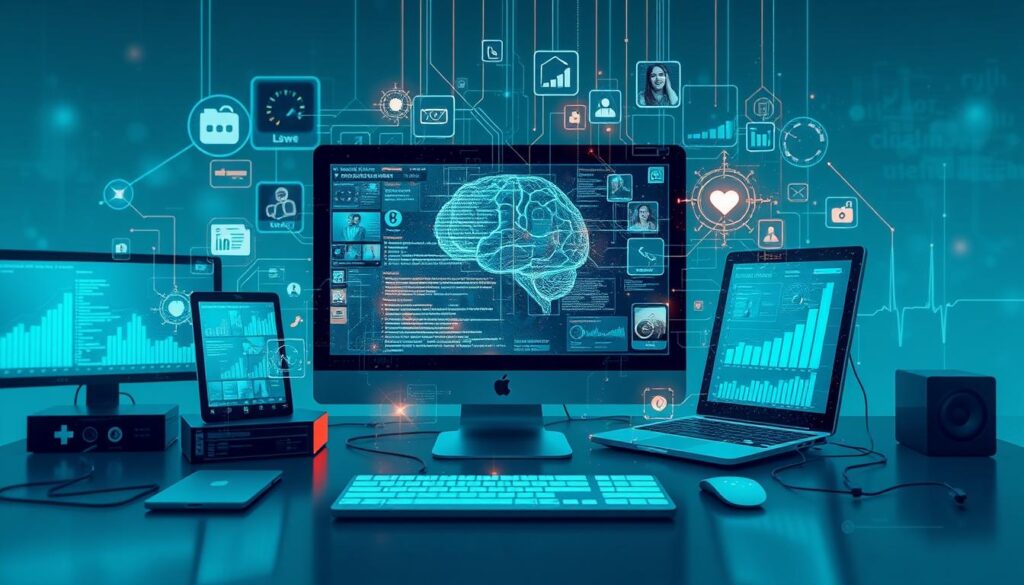
“Well over half of those diagnosed with a mental illness have access to a smartphone.”
Suite of Digital Mental Health Technologies
The digital mental health field is full of new technologies changing how we handle mental health. These include mobile apps, web programs, virtual reality (VR), and artificial intelligence (AI). They make mental health care more accessible, tailored, and based on data.
Digital Interventions
Digital tools like mental health apps and web programs lead this change. They offer education, mood tracking, and exercises like mindfulness. Apps like Calm, Headspace, and Happify bring proven techniques to reduce stress, help sleep better, and increase happiness.
Virtual Reality Therapy
Virtual reality (VR) is making big steps in mental health care. VR exposure therapy helps treat phobias and PTSD by letting patients face their fears safely. It also trains mental health workers to be more empathetic, improving care quality.
Artificial Intelligence in Mental Health
Artificial intelligence (AI) is becoming more important in mental health. AI chatbots offer support, and predictive analytics spot early signs of mental health issues. Tools like Talkspace and BetterHelp connect people with therapists, making care easier to get.
| Technology | Application | Examples |
|---|---|---|
| Mental Health Apps | Psychoeducation, Mood Tracking, Mindfulness | Calm, Headspace, Happify |
| Virtual Reality Therapy | Exposure Therapy, Empathy Training | N/A |
| Artificial Intelligence | Chatbots, Predictive Analytics | Talkspace, BetterHelp |
These new digital tools are changing how we get, use, and interact with mental health care. They offer tailored and data-driven solutions for our growing mental health needs.

Benefits of Digital Mental Health
In today’s digital age, mental health care is changing fast. Digital mental health tools are bringing big benefits to those who need help. They make it easier to get care, especially for people in remote or hard-to-reach areas.
These tools also offer a sense of anonymity. This can help people who are shy about getting help because of the stigma around mental health. They can feel more comfortable opening up online.
Another big plus is that these platforms can lead to traditional care. For some, going to therapy in person feels scary. Digital tools make it easier to start, helping people get used to mental health services. This can lead to better outcomes when they move to in-person therapy with a professional.
“Digital mental health technologies are revolutionizing the way we approach mental health care, offering improved accessibility, anonymity, and a pathway to traditional support.”
The COVID-19 pandemic has made mental health issues worse, with a 25% increase in anxiety and depression worldwide. Digital mental health is key in helping people get the support they need. It’s making mental health care more accessible and innovative.
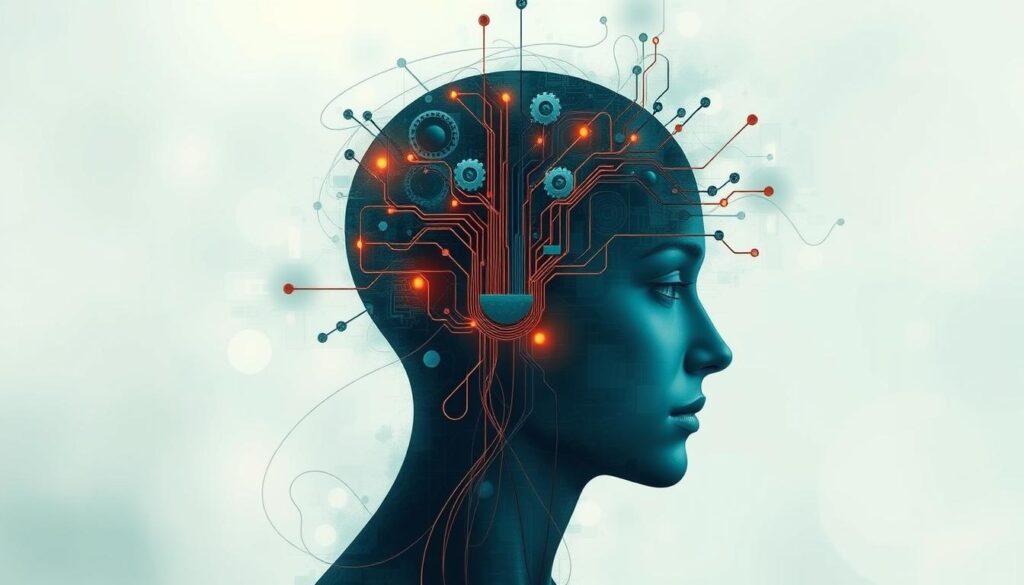
Data-Driven Mental Health Care
Technology is changing mental health care by gathering rich data on how people feel. Digital phenotyping uses smartphones to track behavior. Ecological momentary assessment gets self-reports in real time. This gives therapists a deeper look into a client’s mental health.
This data helps make treatment plans more personal. It also makes therapy sessions more effective. This creates a blended care approach that mixes digital and traditional methods. This blend makes mental health support smoother and more effective.
Leveraging Data for Personalized Care
Old ways of treating mental health don’t work for everyone. The Diagnostic and Statistical Manual lists over 300 mental disorders without a clear test for any. There are about 227 ways a person can feel depressed.
Data helps doctors understand a patient’s mental health better. This lets them tailor treatments. Studies show that custom therapy can really help patients.
Ieso, a UK digital mental health service, has over 600,000 treatment sessions in its database. They work with the University of Sheffield to improve their therapies. They found five main types of depression and 14 different ways it can show up.
Using data in mental health care helps patients get better faster. It also lets doctors help more people. John Torous of Harvard Medical School’s Beth Israel Deaconess Medical Center says digital methods give us detailed info on people’s mental health in real time.
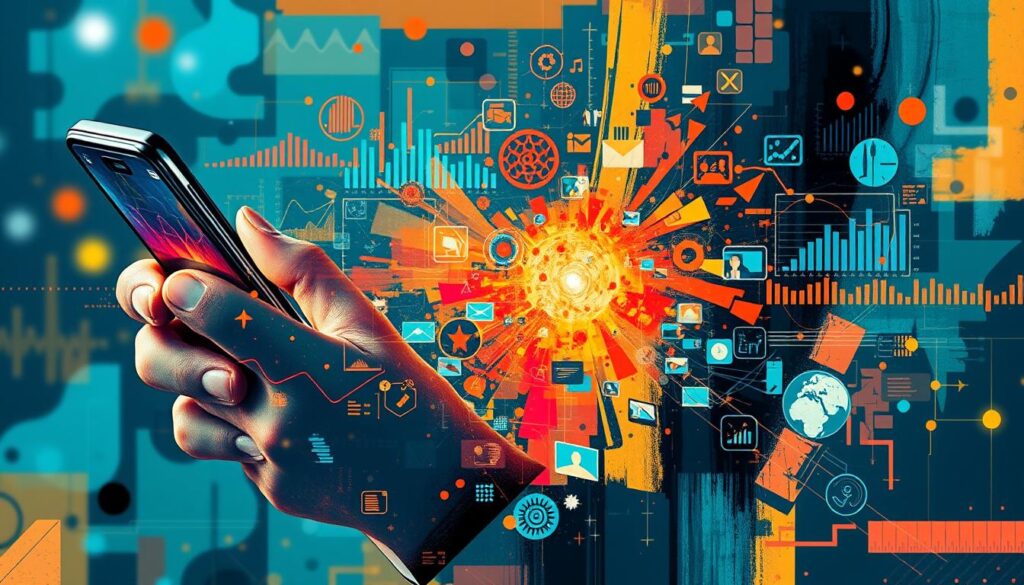
By using data in care, mental health providers can offer more tailored support. This is key as the need for mental health services grows. Digital tech will play a big role in the future of mental health care.
Mental Health Tech
The world of mental health tech is changing fast. It now includes many digital tools and services to help people get better care. These tools range from mobile apps and virtual reality to artificial intelligence and data insights. They are changing how we get mental health support.
By using digital innovation, mental health experts can offer better care. They can give care that is more tailored to each person’s needs. This makes getting help easier and more effective.
Mental health tech is blending with traditional care to bring new ideas and better support. Studies show that virtual reality can help with anxiety and other mental health issues. Transcranial magnetic stimulation (TMS) is also showing promise for treating depression that doesn’t respond to usual treatments. And, tDCS might help with anxiety and OCD.
The digital health and wellness tech movement has brought new tools to the table. These include online symptom tracking with AI and wearable devices that track mood and emotions. Skill-training apps are also helping people manage anxiety and find social support.
| Metric | Value |
|---|---|
| Average timeline to become a Mental Health Tech | 2-4 years |
| Demand for Mental Health Techs | Surge in healthcare settings |
| Median Annual Wage for Mental Health Techs | $35,030 |
| Job Growth Rate for Psychiatric Technicians | 13% by 2029 |
The mental health tech field is growing fast. It’s bringing technology into mental health care. This is making care more personal, accessible, and effective for those who need it.

Digital Interventions for Mental Health
Digital tools are changing how we handle mental health. They offer a wide range of apps, from self-help apps to tools for improving thinking skills. These apps help people manage their mental health better.
Self-Management Apps
Self-management apps let users track their mood and remember to take their medicine. They also offer strategies for dealing with stress and anxiety. These apps help people take control of their mental health, making them more aware of their feelings and giving them the tools to cope.
Cognitive Remediation
For those with serious mental health issues, apps for cognitive remediation can help. They use games and challenges to improve thinking skills like memory and problem-solving. These apps can be a big help, making it easier to get better without traditional therapy.
Skill Training
Apps for skill training use games to teach new ways to handle mental health. They offer personalized advice to help with emotional control and stress. This makes learning new skills fun and rewarding.
These digital tools can be used alone or with other treatments. They offer personalized support and can make traditional therapy more effective. As technology gets better, these tools could change mental health care a lot.
| Digital Mental Health Intervention | Key Features | Benefits |
|---|---|---|
| Self-Management Apps |
|
|
| Cognitive Remediation Apps |
|
|
| Skill Training Apps |
|
|
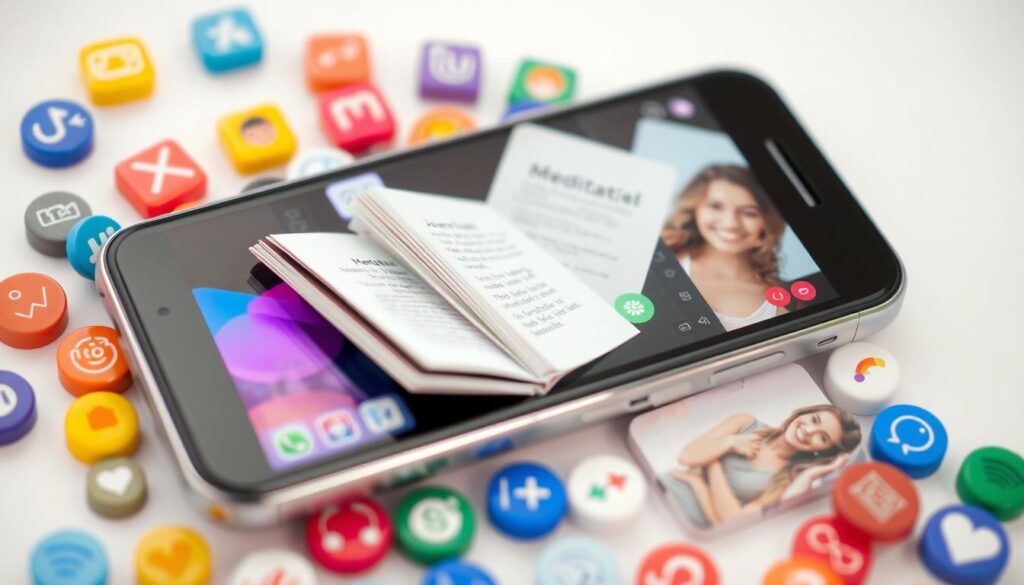
“The COVID-19 pandemic has amplified the need for accessible and innovative mental health solutions. Digital interventions are rising to the challenge, empowering individuals to take charge of their well-being in an increasingly connected world.”
Teletherapy and Mobile Apps
In today’s world, teletherapy and mobile apps are changing mental health care. Teletherapy, or virtual therapy, lets people talk to mental health experts from anywhere using video calls or phones. This breaks down barriers to getting help. Mental health-focused mobile apps offer tools like mood tracking and meditation right on your phone.
These digital tools are proving to be effective for many mental health issues, like depression and anxiety. Research shows that about 40% of people get better with teletherapy for these issues. For OCD, around 63% of patients saw big improvements in just 12 weeks.
These digital tools make getting help easier for those in hard-to-reach places or with limited mobility. They also help reduce the shame of seeking mental health help by offering privacy.
| Modality | Efficacy | Benefits |
|---|---|---|
| Teletherapy |
|
|
| Mental Health Apps |
|
|
Even with their benefits, teletherapy and apps still face challenges like tech issues and privacy concerns. But, as they keep evolving, they could change how we get mental health care.
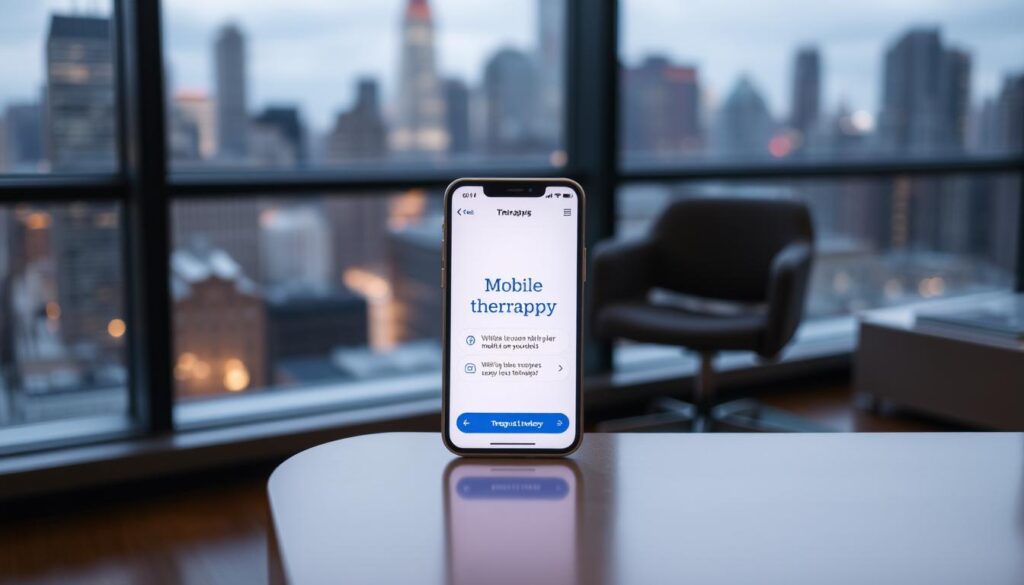
Virtual Reality in Mental Health Treatment
Virtual reality (VR) is changing the way we treat mental health issues. It offers new ways to help people overcome fears and understand others’ feelings. This technology is being used for a variety of mental health problems, like anxiety and PTSD.
Exposure Therapy and VR
VR exposure therapy helps patients face their fears in a safe virtual space. It’s shown to be very effective for treating phobias, panic disorders, and PTSD. By slowly introducing patients to scary situations, therapists help them deal with their fears and feel better.
Empathy Training with VR
VR is also changing how we learn empathy. “Empathy machines” let people experience life from another person’s perspective. This helps people understand and care more about others, which is great for mental health care and training for professionals.
VR is becoming a big part of mental health care, but there are still hurdles. We need more trained therapists and the gear is expensive. But, as VR keeps getting better, it could really change how we handle mental health issues.
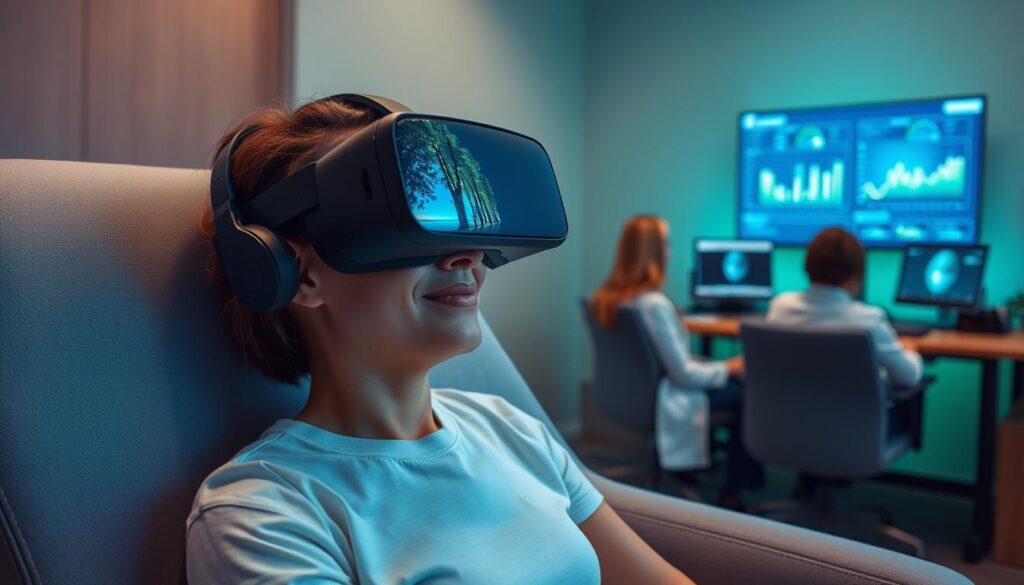
“Virtual reality is being increasingly used in the treatment of anxiety, eating disorders, and post-traumatic stress disorder.”
| Condition | VR Therapy Effectiveness |
|---|---|
| Anxiety Disorders | Highly Effective |
| Post-Traumatic Stress Disorder (PTSD) | Highly Effective |
| Eating Disorders | Promising Results |
| Phobias (e.g., Social Anxiety, Acrophobia) | Highly Effective |
Artificial Intelligence in Mental Health
Artificial Intelligence (AI) is changing how we care for mental health. It uses Natural Language Processing (NLP) to make chatbots that talk with patients. These AI-powered chatbots for therapy help people who don’t want to see a therapist in person.
AI-driven predictive analytics look at lots of data to spot mental health issues early. This lets doctors act fast. Machine learning helps doctors make better choices with the resources they have.
| Key AI Applications in Mental Health | Impact |
|---|---|
| Natural Language Processing (NLP) for Chatbots | Provides accessible, on-demand therapeutic support |
| Predictive Analytics | Identifies early warning signs of mental health crises for proactive intervention |
| Machine Learning for Data Analysis | Generates insights to optimize mental health resource utilization |
AI-driven technologies can make care better, help patients more, and tackle the mental health crisis. As AI in mental health grows, we’ll see big changes in how we care for mental health.
“Artificial intelligence has the potential to revolutionize mental health care by providing personalized, accessible, and data-driven solutions that can improve patient outcomes and optimize resource utilization.”

Challenges and Ethical Considerations
Digital mental health technologies have brought both good news and tough challenges. Many mental health apps might not meet the needed standards. Ensuring the quality and effectiveness of digital mental health interventions is key to safe and reliable care.
Keeping users interested in digital tools is hard. The newness wears off, and people find it hard to use these tools every day. It’s important to keep users engaged to make a lasting impact with digital mental health solutions.
Ethical Considerations
The growth of digital mental health raises ethical questions. There are worries about too much screen time and replacing human talks with tech. We also need to be careful with the idea that tech alone can fix complex mental health issues.
Companies using mental health tech must focus on data security and employee privacy to stop misuse or illegal access to private info. It’s important to respect people’s choices and make sure they understand what they’re getting into.
It’s key that digital mental health tools are accessible and inclusive for everyone, no matter their abilities or background. Providing training and support for employees on how to use these tools right is also crucial.
As the challenges of digital mental health and ethical considerations grow, tackling these issues is vital. This will help make these new technologies work well in mental health care for the long run.
| Challenge | Description |
|---|---|
| Quality Control | Ensuring the quality and effectiveness of digital mental health interventions to provide safe and reliable care. |
| User Retention | Maintaining patient engagement with digital tools to maximize the long-term impact of digital mental health solutions. |
| Ethical Considerations | Addressing concerns about the perceived “over-promotion” of screen time, the replacement of human interaction, and the notion of “technological solutionism”. |
| Data Security and Privacy | Prioritizing data security and employee privacy to prevent abuse or illegal access to confidential information. |
| Accessibility and Inclusivity | Ensuring digital mental health tools are available and usable by all employees, regardless of their abilities or background. |
| Training and Support | Providing training and support for employees in using mental health technologies responsibly. |
Stakeholder-Centered Design Approach
Experts say we need a stakeholder-centered design approach for user-centric digital mental health. This means working together with mental health experts, researchers, tech experts, and users. Together, they create digital tools that really help patients and those who care for them.
Using an interdisciplinary approach to digital mental health, we can make tech that works well, is right, and meets people’s needs. This teamwork makes sure everyone’s ideas are heard. It leads to digital health solutions that truly make a difference.
Research shows that making digital mental health tools with people in mind is key. But, not all apps really involve users in making them. Only about 27% of studies say designers are part of the team.
| Key Statistics | Findings |
|---|---|
| User Retention Rates | The overall user retention rate for mobile mental health apps is very low, with a 15-day retention rate of 3.9% and a 30-day retention rate of 3.3%. |
| Health App Downloads | Data on the health app market indicate that most health apps are downloaded fewer than 5,000 times, and 46% have less than one monthly active user. |
| App Development Costs | The average cost of developing a mobile health app is US $425,000. |
To make digital mental health technologies work long-term, we need a stakeholder-centered design approach. By working with a wide range of people, including users, we can make tools that really help those they’re for.
“The involvement of end-users in the actual design process is not always explicit, and the presence of designers on the development teams is reported in only 27% of the studies.”
Future of Digital Mental Health
The digital revolution is changing our world fast. It’s bringing new hope to mental health care. Technologies like virtual reality (VR), artificial intelligence (AI), and predictive analytics are set to change how we get help for our minds.
VR is becoming a big deal in mental health care. It’s already shown to be very effective for things like PTSD, anxiety, and psychosis. For instance, OxfordVR’s VR therapy for psychosis got a special FDA approval in 2022. This shows VR could be a big part of the future.
AI is also changing the game in mental health. AI chatbots and algorithms can offer personalized support anytime. Predictive analytics can spot early signs of mental health problems. This means we can act sooner to help people.
But, we need to think carefully about the future of digital mental health. We must focus on making sure these tools are safe, work well, and respect our privacy. It’s all about finding the right mix of tech and caring for people.
The future of digital mental health is thrilling and fast-changing. It could really change how we care for our minds. It’s up to experts, researchers, and leaders to make sure this change is good for everyone. They can help make mental health care better for people all over the world.
“The future of digital mental health is an exciting and rapidly evolving landscape, one that holds the promise of transforming the way we approach and deliver mental health care.”
Conclusion
Technology is changing how we get help for our mental health. It makes getting care easier and more tailored to each person. Digital tools are making mental health services better.
The mental health tech world is growing fast. We need to tackle the challenges and think about ethics. It’s important to focus on what users need and use proven methods.
By using technology wisely together, we can make mental health care better for everyone. This includes making it more accessible and personal. We also need to think about the right way to use these new tools.
This journey into digital mental health shows us how big of an impact tech can have. It helps make getting help easier and more tailored. We must also consider the ethical sides of using these technologies.
In short, adding technology to mental health care is a big step forward. It could really help people and make more services available. As we move forward with digital mental health, we must keep focusing on what’s best for people and communities.

